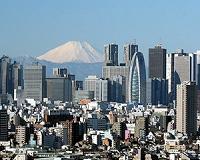 |
Washington (AFP) March 24, 2011 Restoring power and government reconstruction spending are crucial to Japan's economy resuming growth, the IMF said Thursday, after Tokyo put the damage of the March 11 earthquake at $309 billion. International Monetary Fund officials said they expected a short-term slowdown, but growth would "rebound" to pre-quake levels and more. But unlike natural disasters in other countries, the potential of sustained power shortages due to the Fukushima Daiichi plant emergency, the shutdowns of other nuclear plants and the radiation threat complicate recovery prospects, they said. "The uncertainties from the nuclear situation and the power interruptions could weigh on the recovery by disrupting production across the country, and by weighing on corporate and household sentiment," said Ken Kang, the IMF's Asia Pacific division chief. Kang cited Japanese government figures that three to five percent of the country's capital stock was damaged or destroyed in the quake and subsequent tsunami, about double the scope of damage done by the 1995 Kobe earthquake. "Despite the extensive damage we are of the view that the economic costs are manageable," he said. Japan's government is fiscally strong enough to handle the recovery costs, and that boosting spending to rebuild the country would have no long-term impact on its fiscal standing. "We view Japan as having a relatively ample pool of savings that it can finance its own reconstruction needs," said Mahmoud Pradhan, the IMF Japan mission chief. The officials praised Japanese institutions, especially the Bank of Japan, for their "decisive and swift" response to the quake, and said the damage to the overall financial system is minimal." They said the government did not need external aid, and that it had 1.3 trillion yen ($16 billion) available for quick disbursement to start the recovery.
Share This Article With Planet Earth
Related Links
 Saving Electricity In A Hurry-Tokyo Has Done It Before And Can Do It Again
Saving Electricity In A Hurry-Tokyo Has Done It Before And Can Do It AgainParis, France (SPX) Mar 24, 2011 Not long ago, Japan faced a major power crisis. In September 2002, the Tokyo Electric Power Company (TEPCO) was forced to shut down 17 nuclear power plants for emergency safety inspections. The winter of 2002-2003 was approaching, and the plants, which were expected to remain closed for months, would be unavailable through summer 2003, a time when demand from summertime air conditioning wo ... read more |
|
| The content herein, unless otherwise known to be public domain, are Copyright 1995-2010 - SpaceDaily. AFP and UPI Wire Stories are copyright Agence France-Presse and United Press International. ESA Portal Reports are copyright European Space Agency. All NASA sourced material is public domain. Additional copyrights may apply in whole or part to other bona fide parties. Advertising does not imply endorsement,agreement or approval of any opinions, statements or information provided by SpaceDaily on any Web page published or hosted by SpaceDaily. Privacy Statement |